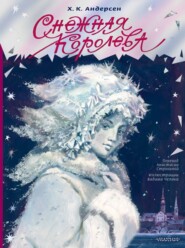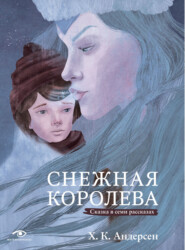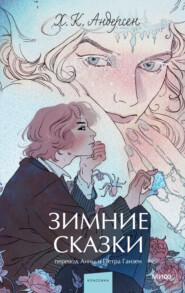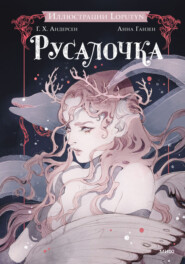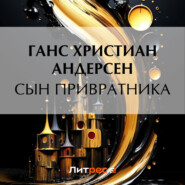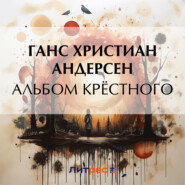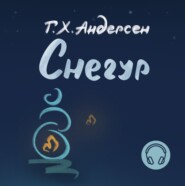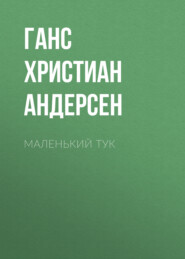По всем вопросам обращайтесь на: info@litportal.ru
(©) 2003-2024.
✖
What the Moon Saw: and Other Tales
Настройки чтения
Размер шрифта
Высота строк
Поля
For a whole mile round about the sounds of the flute were heard, and singular events took place. A rich banker's family, driving along in a coach and four, was blown quite out of the carriage, and could not even find a place on the footboard at the back. Two rich peasants who in our times had grown too high for their corn-fields, were tumbled into the ditch. It was a dangerous flute, that: luckily, it burst at the first note, and that was a good thing, for then it was put back into the owner's pocket. "Everything in its right place."
The day afterwards not a word was said about this marvellous event; and thence has come the expression "pocketing the flute." Everything was in its usual order, only that the two old portraits of the dealer and the goose-girl hung on the wall in the banqueting hall. They had been blown up yonder, and as one of the real connoisseurs said they had been painted by a master's hand, they remained where they were, and were restored. "Everything in its right place."
And to that it will come; for hereafter is long – longer than this story.
THE GOBLIN AND THE HUCKSTER
There was once a regular student: he lived in a garret, and nothing at all belonged to him; but there was also once a regular huckster: he lived on the ground floor, and the whole house was his; and the goblin kept with him, for on the huckster's table on Christmas Eve there was always a dish of plum porridge, with a great piece of butter floating in the middle. The huckster could accomplish that; and consequently the goblin stuck to the huckster's shop, and that was very interesting.
One evening the student came through the back door to buy candles and cheese for himself. He had no one to send, and that's why he came himself. He procured what he wanted and paid for it, and the huckster and his wife both nodded a "good evening" to him; and the woman was one who could do more than merely nod – she had an immense power of tongue! And the student nodded too, and then suddenly stood still, reading the sheet of paper in which the cheese had been wrapped. It was a leaf torn out of an old book, a book that ought not to have been torn up, a book that was full of poetry.
"Yonder lies some more of the same sort," said the huckster: "I gave an old woman a little coffee for the books; give me two groschen, and you shall have the remainder."
"Yes," said the student, "give me the book instead of the cheese: I can eat my bread and butter without cheese. It would be a sin to tear the book up entirely. You are a capital man, a practical man, but you understand no more about poetry than does that cask yonder."
Now, that was an insulting speech, especially towards the cask; but the huckster laughed and the student laughed, for it was only said in fun. But the goblin was angry that any one should dare to say such things to a huckster who lived in his own house and sold the best butter.
When it was night, and the shop was closed and all were in bed, the goblin came forth, went into the bedroom, and took away the good lady's tongue; for she did not want that while she was asleep; and whenever he put this tongue upon any object in the room, the said object acquired speech and language, and could express its thoughts and feelings as well as the lady herself could have done; but only one object could use it at a time, and that was a good thing, otherwise they would have interrupted each other.
And the goblin laid the tongue upon the cask in which the old newspapers were lying.
"Is it true," he asked, "that you don't know what poetry means?"
"Of course I know it," replied the cask: "poetry is something that always stands at the foot of a column in the newspapers, and is sometimes cut out. I dare swear I have more of it in me than the student, and I'm only a poor tub compared to the huckster."
Then the goblin put the tongue upon the coffee-mill, and, mercy! how it began to go! And he put it upon the butter-cask, and on the cash-box: they were all of the waste-paper cask's opinion, and the opinion of the majority must be respected.
"Now I shall tell it to the student!" And with these words the goblin went quite quietly up the back stairs to the garret, where the student lived. The student had still a candle burning, and the goblin peeped through the keyhole, and saw that he was reading in the torn book that he had carried up out of the shop downstairs.
But how light it was in his room! Out of the book shot a clear beam, expanding into a thick stem, and into a mighty tree, which grew upward and spread its branches far over the student. Each leaf was fresh, and every blossom was a beautiful female head, some with dark sparkling eyes, others with wonderfully clear blue orbs; every fruit was a gleaming star, and there was a glorious sound of song in the student's room.
Never had the little goblin imagined such splendour, far less had he ever seen or heard anything like it. He stood still on tiptoe, and peeped in till the light went out in the student's garret. Probably the student blew it out, and went to bed; but the little goblin remained standing there nevertheless, for the music still sounded on, soft and beautiful – a splendid cradle song for the student who had lain down to rest.
"This is an incomparable place," said the goblin: "I never expected such a thing! I should like to stay here with the student." And then the little man thought it over – and he was a sensible little man too – but he sighed, "The student has no porridge!" And then he went down again to the huckster's shop: and it was a very good thing that he got down there again at last, for the cask had almost worn out the good woman's tongue, for it had spoken out at one side everything that was contained in it, and was just about turning itself over, to give it out from the other side also, when the goblin came in, and restored the tongue to its owner. But from that time forth the whole shop, from the cash-box down to the firewood, took its tone from the cask, and paid him such respect, and thought so much of him, that when the huckster afterwards read the critical articles on theatricals and art in the newspaper, they were all persuaded the information came from the cask itself.
But the goblin could no longer sit quietly and contentedly listening to all the wisdom down there: so soon as the light glimmered from the garret in the evening he felt as if the rays were strong cables drawing him up, and he was obliged to go and peep through the keyhole; and there a feeling of greatness rolled around him, such as we feel beside the ever-heaving sea when the storm rushes over it, and he burst into tears! He did not know himself why he was weeping, but a peculiar feeling of pleasure mingled with his tears. How wonderfully glorious it must be to sit with the student under the same tree! But that might not be, he was obliged to be content with the view through the keyhole, and to be glad of that. There he stood on the cold landing-place, with the autumn wind blowing down from the loft-hole: it was cold, very cold; but the little mannikin only felt that when the light in the room was extinguished, and the tones in the tree died away. Ha! then he shivered, and crept down again to his warm corner, where it was homely and comfortable.
And when Christmas came, and brought with it the porridge and the great lump of butter, why, then he thought the huckster the better man.
But in the middle of the night the goblin was awaked by a terrible tumult and beating against the window shutters. People rapped noisily without, and the watchman blew his horn, for a great fire had broken out – the whole street was full of smoke and flame. Was it in the house itself, or at a neighbour's? Where was it? Terror seized on all. The huckster's wife was so bewildered that she took her gold earrings out of her ears and put them in her pocket, that at any rate she might save something; the huckster ran for his share-papers; and the maid for her black silk mantilla, for she had found means to purchase one. Each one wanted to save the best thing they had; the goblin wanted to do the same thing, and in a few leaps he was up the stairs, and into the room of the student, who stood quite quietly at the open window, looking at the conflagration that was raging in the house of the neighbour opposite. The goblin seized upon the wonderful book which lay upon the table, popped it into his red cap, and held the cap tight with both hands. The great treasure of the house was saved; and now he ran up and away, quite on to the roof of the house, on to the chimney. There he sat, illuminated by the flames of the burning house opposite, both hands pressed tightly over his cap, in which the treasure lay; and now he knew the real feelings of his heart, and knew to whom it really belonged. But when the fire was extinguished, and the goblin could think calmly again, why, then…
"I must divide myself between the two," he said; "I can't quite give up the huckster, because of the porridge!"
Now, that was spoken quite like a human creature. We all of us visit the huckster for the sake of the porridge.
IN A THOUSAND YEARS
Yes, in a thousand years people will fly on the wings of steam through the air, over the ocean! The young inhabitants of America will become visitors of old Europe. They will come over to see the monuments and the great cities, which will then be in ruins, just as we in our time make pilgrimages to the tottering splendours of Southern Asia. In a thousand years they will come!
The Thames, the Danube, and the Rhine still roll their course, Mont Blanc stands firm with its snow-capped summit, and the Northern Lights gleam over the lands of the North; but generation after generation has become dust, whole rows of the mighty of the moment are forgotten, like those who already slumber under the hill on which the rich trader whose ground it is has built a bench, on which he can sit and look out across his waving corn-fields.
"To Europe!" cry the young sons of America; "to the land of our ancestors, the glorious land of monuments and fancy – to Europe!"
The ship of the air comes. It is crowded with passengers, for the transit is quicker than by sea. The electro-magnetic wire under the ocean has already telegraphed the number of the aërial caravan. Europe is in sight: it is the coast of Ireland that they see, but the passengers are still asleep; they will not be called till they are exactly over England. There they will first step on European shore, in the land of Shakespeare as the educated call it; in the land of politics, the land of machines, as it is called by others.
Here they stay a whole day. That is all the time the busy race can devote to the whole of England and Scotland. Then the journey is continued through the tunnel under the English Channel, to France, the land of Charlemagne and Napoleon. Moliere is named: the learned men talk of the classic school of remote antiquity: there is rejoicing and shouting for the names of heroes, poets, and men of science, whom our time does not know, but who will be born after our time in Paris, the crater of Europe.
The air steamboat flies over the country whence Columbus went forth, where Cortez was born, and where Calderon sang dramas in sounding verse. Beautiful black-eyed women live still in the blooming valleys, and the oldest songs speak of the Cid and the Alhambra.
Then through the air, over the sea, to Italy, where once lay old, everlasting Rome. It has vanished! The Campagna lies desert: a single ruined wall is shown as the remains of St. Peter's, but there is a doubt if this ruin be genuine.
Next to Greece, to sleep a night in the grand hotel at the top of Mount Olympus, to say that they have been there; and the journey is continued to the Bosphorus, to rest there a few hours, and see the place where Byzantium lay; and where the legend tells that the harem stood in the time of the Turks, poor fishermen are now spreading their nets.
Over the remains of mighty cities on the broad Danube, cities which we in our time know not, the travellers pass; but here and there, on the rich sites of those that time shall bring forth, the caravan sometimes descends, and departs thence again.
Down below lies Germany, that was once covered with a close net of railways and canals, the region where Luther spoke, where Goëthe sang, and Mozart once held the sceptre of harmony! Great names shine there, in science and in art, names that are unknown to us. One day devoted to seeing Germany, and one for the North, the country of Oersted and Linnæus, and for Norway, the land of the old heroes and the young Normans. Iceland is visited on the journey home: the geysers burn no more, Hecla is an extinct volcano, but the rocky island is still fixed in the midst of the foaming sea, a continual monument of legend and poetry.
"There is really a great deal to be seen in Europe," says the young American, "and we have seen it in a week, according to the directions of the great traveller" (and here he mentions the name of one of his contemporaries) "in his celebrated work, 'How to See all Europe in a Week.'"
THE BOND OF FRIENDSHIP
We have just taken a little journey, and already we want to take a longer one. Whither? To Sparta, to Mycene, to Delphi? There are a hundred places at whose names the heart beats with the desire of travel. On horseback we go up the mountain paths, through brake and through brier. A single traveller makes an appearance like a whole caravan. He rides forward with his guide, a pack-horse carries trunks, a tent, and provisions, and a few armed soldiers follow as a guard. No inn with warm beds awaits him at the end of his tiring day's journey: the tent is often his dwelling-place. In the great wild region the guide cooks him a pillan of rice, fowls, and curry for his supper. A thousand gnats swarm round the tent. It is a boisterous night, and to-morrow the way will lead across swollen streams; take care you are not washed away!
What is your reward for undergoing these hardships? The fullest, richest reward. Nature manifests herself here in all her greatness; every spot is historical, and the eye and the thoughts are alike delighted. The poet may sing it, the painter portray it in rich pictures; but the air of reality which sinks deep into the soul of the spectator, and remains there, neither painter nor poet can produce.
In many little sketches I have endeavoured to give an idea of a small part of Athens and its environs; but how colourless the picture seems! How little does it exhibit Greece, the mourning genius of beauty, whose greatness and whose sorrow the stranger never forgets!
The lonely herdsman yonder on the hills would, perhaps, by a simple recital of an event in his life, better enlighten the stranger who wishes in a few features to behold the land of the Hellenes, than any picture could do.
"Then," says my Muse, "let him speak." A custom, a good, peculiar custom, shall be the subject of the mountain shepherd's tale. It is called
THE BOND OF FRIENDSHIP
Our rude house was put together of clay; but the door-posts were columns of fluted marble found near the spot where the house was erected. The roof reached almost down to the ground. It was now dark brown and ugly, but it had originally consisted of blooming olive and fresh laurel branches brought from beyond the mountain. Around our dwelling was a narrow gorge, whose walls of rock rose steeply upwards, and showed naked and black, and round their summits often hung clouds, like white living figures. Never did I hear a singing bird there, never did the men there dance to the sound of the bagpipe; but the spot was sacred from the old times: even its name reminded of this, for it was called Delphi! The dark solemn mountains were all covered with snow; the highest, which gleamed the longest in the red light of evening, was Parnassus; the brook which rolled from it near our house was once sacred also. Now the ass sullies it with its feet, but the stream rolls on and on, and becomes clear again. How I can remember every spot in the deep holy solitude! In the midst of the hut a fire was kindled, and when the hot ashes lay there red and glowing, the bread was baked in them. When the snow was piled so high around our hut as almost to hide it, my mother appeared most cheerful: then she would hold my head between her hands, and sing the songs she never sang at other times, for the Turks our masters would not allow it. She sang:
"On the summit of Olympus, in the forest of dwarf firs, lay an old stag. His eyes were heavy with tears; he wept blue and even red tears; and there came a roebuck by, and said, 'What ails thee, that thou weepest those blue and red tears?' And the stag answered, 'The Turk has come to our city: he has wild dogs for the chase, a goodly pack.' 'I will drive them away across the islands,' cried the young roebuck, 'I will drive them away across the islands into the deep sea!' But before evening sank down the roebuck was slain, and before night the stag was hunted and dead."
And when my mother sang thus, her eyes became moist, and on the long eyelashes hung a tear; but she hid it, and baked our black bread in the ashes. Then I would clench my fist and cry, "We will kill the Turks!" but she repeated from the song the words, "I will drive them across the islands into the deep sea. But before evening sank down the roebuck was slain, and before the night came the stag was hunted and dead."
For several days and nights we had been lonely in our hut, when my father came home. I knew he would bring me shells from the Gulf of Lepanto, or perhaps even a bright gleaming knife. This time he brought us a child, a little half-naked girl, that he brought under his sheepskin cloak. It was wrapped in a fur, and all that the little creature possessed when this was taken off, and she lay in my mother's lap, were three silver coins, fastened in her dark hair. My father told us that the Turks had killed the child's parents; and he told so much about them, that I dreamed of the Turks all night. He himself had been wounded, and my mother bound up his arm. The wound was deep, and the thick sheepskin was stiff with frozen blood. The little maiden was to be my sister. How radiantly beautiful she looked! Even my mother's eyes were not more gentle than hers. Anastasia, as she was called, was to be my sister, because her father had been united to mine by the old custom which we still keep. They had sworn brotherhood in their youth, and chosen the most beautiful and virtuous girl in the neighbourhood to consecrate their bond of friendship. I often heard of the strange good custom.
So now the little girl was my sister. She sat in my lap, and I brought her flowers and the feathers of the mountain birds: we drank together of the waters of Parnassus, and dwelt together for many a year under the laurel roof of the hut, while my mother sang winter after winter of the stag who wept red tears. But as yet I did not understand that it was my own countrymen whose many sorrows were mirrored in those tears.
One day there came three Frankish men. Their dress was different from ours. They had tents and beds with them on their horses, and more than twenty Turks, all armed with swords and muskets, accompanied them; for they were friends of the pacha, and had letters from him commanding an escort for them. They only came to see our mountains, to ascend Parnassus amid the snow and the clouds, and to look at the strange black steep rock near our hut. They could not find room in it, nor could they endure the smoke that rolled along the ceiling and found its way out at the low door; therefore they pitched their tents on the small space outside our dwelling, roasted lambs and birds, and poured out strong sweet wine, of which the Turks were not allowed to partake.
When they departed, I accompanied them for some distance, carrying my little sister Anastasia, wrapped in a goatskin, on my back. One of the Frankish gentlemen made me stand in front of a rock, and drew me, and her too, as we stood there, so that we looked like one creature. I never thought of it; but Anastasia and I were really one. She was always sitting in my lap or riding in the goatskin at my back; and when I dreamed, she appeared in my dreams.
Two nights afterwards, other men, armed with knives and muskets, came into our tent. They were Albanians, brave men, my mother told me. They only stayed a short time. My sister Anastasia sat on the knee of one of them, and when they were gone she had not three, but only two silver coins in her hair. They wrapped tobacco in strips of paper and smoked it. I remember they were undecided as to the road they were to take.
The day afterwards not a word was said about this marvellous event; and thence has come the expression "pocketing the flute." Everything was in its usual order, only that the two old portraits of the dealer and the goose-girl hung on the wall in the banqueting hall. They had been blown up yonder, and as one of the real connoisseurs said they had been painted by a master's hand, they remained where they were, and were restored. "Everything in its right place."
And to that it will come; for hereafter is long – longer than this story.
THE GOBLIN AND THE HUCKSTER
There was once a regular student: he lived in a garret, and nothing at all belonged to him; but there was also once a regular huckster: he lived on the ground floor, and the whole house was his; and the goblin kept with him, for on the huckster's table on Christmas Eve there was always a dish of plum porridge, with a great piece of butter floating in the middle. The huckster could accomplish that; and consequently the goblin stuck to the huckster's shop, and that was very interesting.
One evening the student came through the back door to buy candles and cheese for himself. He had no one to send, and that's why he came himself. He procured what he wanted and paid for it, and the huckster and his wife both nodded a "good evening" to him; and the woman was one who could do more than merely nod – she had an immense power of tongue! And the student nodded too, and then suddenly stood still, reading the sheet of paper in which the cheese had been wrapped. It was a leaf torn out of an old book, a book that ought not to have been torn up, a book that was full of poetry.
"Yonder lies some more of the same sort," said the huckster: "I gave an old woman a little coffee for the books; give me two groschen, and you shall have the remainder."
"Yes," said the student, "give me the book instead of the cheese: I can eat my bread and butter without cheese. It would be a sin to tear the book up entirely. You are a capital man, a practical man, but you understand no more about poetry than does that cask yonder."
Now, that was an insulting speech, especially towards the cask; but the huckster laughed and the student laughed, for it was only said in fun. But the goblin was angry that any one should dare to say such things to a huckster who lived in his own house and sold the best butter.
When it was night, and the shop was closed and all were in bed, the goblin came forth, went into the bedroom, and took away the good lady's tongue; for she did not want that while she was asleep; and whenever he put this tongue upon any object in the room, the said object acquired speech and language, and could express its thoughts and feelings as well as the lady herself could have done; but only one object could use it at a time, and that was a good thing, otherwise they would have interrupted each other.
And the goblin laid the tongue upon the cask in which the old newspapers were lying.
"Is it true," he asked, "that you don't know what poetry means?"
"Of course I know it," replied the cask: "poetry is something that always stands at the foot of a column in the newspapers, and is sometimes cut out. I dare swear I have more of it in me than the student, and I'm only a poor tub compared to the huckster."
Then the goblin put the tongue upon the coffee-mill, and, mercy! how it began to go! And he put it upon the butter-cask, and on the cash-box: they were all of the waste-paper cask's opinion, and the opinion of the majority must be respected.
"Now I shall tell it to the student!" And with these words the goblin went quite quietly up the back stairs to the garret, where the student lived. The student had still a candle burning, and the goblin peeped through the keyhole, and saw that he was reading in the torn book that he had carried up out of the shop downstairs.
But how light it was in his room! Out of the book shot a clear beam, expanding into a thick stem, and into a mighty tree, which grew upward and spread its branches far over the student. Each leaf was fresh, and every blossom was a beautiful female head, some with dark sparkling eyes, others with wonderfully clear blue orbs; every fruit was a gleaming star, and there was a glorious sound of song in the student's room.
Never had the little goblin imagined such splendour, far less had he ever seen or heard anything like it. He stood still on tiptoe, and peeped in till the light went out in the student's garret. Probably the student blew it out, and went to bed; but the little goblin remained standing there nevertheless, for the music still sounded on, soft and beautiful – a splendid cradle song for the student who had lain down to rest.
"This is an incomparable place," said the goblin: "I never expected such a thing! I should like to stay here with the student." And then the little man thought it over – and he was a sensible little man too – but he sighed, "The student has no porridge!" And then he went down again to the huckster's shop: and it was a very good thing that he got down there again at last, for the cask had almost worn out the good woman's tongue, for it had spoken out at one side everything that was contained in it, and was just about turning itself over, to give it out from the other side also, when the goblin came in, and restored the tongue to its owner. But from that time forth the whole shop, from the cash-box down to the firewood, took its tone from the cask, and paid him such respect, and thought so much of him, that when the huckster afterwards read the critical articles on theatricals and art in the newspaper, they were all persuaded the information came from the cask itself.
But the goblin could no longer sit quietly and contentedly listening to all the wisdom down there: so soon as the light glimmered from the garret in the evening he felt as if the rays were strong cables drawing him up, and he was obliged to go and peep through the keyhole; and there a feeling of greatness rolled around him, such as we feel beside the ever-heaving sea when the storm rushes over it, and he burst into tears! He did not know himself why he was weeping, but a peculiar feeling of pleasure mingled with his tears. How wonderfully glorious it must be to sit with the student under the same tree! But that might not be, he was obliged to be content with the view through the keyhole, and to be glad of that. There he stood on the cold landing-place, with the autumn wind blowing down from the loft-hole: it was cold, very cold; but the little mannikin only felt that when the light in the room was extinguished, and the tones in the tree died away. Ha! then he shivered, and crept down again to his warm corner, where it was homely and comfortable.
And when Christmas came, and brought with it the porridge and the great lump of butter, why, then he thought the huckster the better man.
But in the middle of the night the goblin was awaked by a terrible tumult and beating against the window shutters. People rapped noisily without, and the watchman blew his horn, for a great fire had broken out – the whole street was full of smoke and flame. Was it in the house itself, or at a neighbour's? Where was it? Terror seized on all. The huckster's wife was so bewildered that she took her gold earrings out of her ears and put them in her pocket, that at any rate she might save something; the huckster ran for his share-papers; and the maid for her black silk mantilla, for she had found means to purchase one. Each one wanted to save the best thing they had; the goblin wanted to do the same thing, and in a few leaps he was up the stairs, and into the room of the student, who stood quite quietly at the open window, looking at the conflagration that was raging in the house of the neighbour opposite. The goblin seized upon the wonderful book which lay upon the table, popped it into his red cap, and held the cap tight with both hands. The great treasure of the house was saved; and now he ran up and away, quite on to the roof of the house, on to the chimney. There he sat, illuminated by the flames of the burning house opposite, both hands pressed tightly over his cap, in which the treasure lay; and now he knew the real feelings of his heart, and knew to whom it really belonged. But when the fire was extinguished, and the goblin could think calmly again, why, then…
"I must divide myself between the two," he said; "I can't quite give up the huckster, because of the porridge!"
Now, that was spoken quite like a human creature. We all of us visit the huckster for the sake of the porridge.
IN A THOUSAND YEARS
Yes, in a thousand years people will fly on the wings of steam through the air, over the ocean! The young inhabitants of America will become visitors of old Europe. They will come over to see the monuments and the great cities, which will then be in ruins, just as we in our time make pilgrimages to the tottering splendours of Southern Asia. In a thousand years they will come!
The Thames, the Danube, and the Rhine still roll their course, Mont Blanc stands firm with its snow-capped summit, and the Northern Lights gleam over the lands of the North; but generation after generation has become dust, whole rows of the mighty of the moment are forgotten, like those who already slumber under the hill on which the rich trader whose ground it is has built a bench, on which he can sit and look out across his waving corn-fields.
"To Europe!" cry the young sons of America; "to the land of our ancestors, the glorious land of monuments and fancy – to Europe!"
The ship of the air comes. It is crowded with passengers, for the transit is quicker than by sea. The electro-magnetic wire under the ocean has already telegraphed the number of the aërial caravan. Europe is in sight: it is the coast of Ireland that they see, but the passengers are still asleep; they will not be called till they are exactly over England. There they will first step on European shore, in the land of Shakespeare as the educated call it; in the land of politics, the land of machines, as it is called by others.
Here they stay a whole day. That is all the time the busy race can devote to the whole of England and Scotland. Then the journey is continued through the tunnel under the English Channel, to France, the land of Charlemagne and Napoleon. Moliere is named: the learned men talk of the classic school of remote antiquity: there is rejoicing and shouting for the names of heroes, poets, and men of science, whom our time does not know, but who will be born after our time in Paris, the crater of Europe.
The air steamboat flies over the country whence Columbus went forth, where Cortez was born, and where Calderon sang dramas in sounding verse. Beautiful black-eyed women live still in the blooming valleys, and the oldest songs speak of the Cid and the Alhambra.
Then through the air, over the sea, to Italy, where once lay old, everlasting Rome. It has vanished! The Campagna lies desert: a single ruined wall is shown as the remains of St. Peter's, but there is a doubt if this ruin be genuine.
Next to Greece, to sleep a night in the grand hotel at the top of Mount Olympus, to say that they have been there; and the journey is continued to the Bosphorus, to rest there a few hours, and see the place where Byzantium lay; and where the legend tells that the harem stood in the time of the Turks, poor fishermen are now spreading their nets.
Over the remains of mighty cities on the broad Danube, cities which we in our time know not, the travellers pass; but here and there, on the rich sites of those that time shall bring forth, the caravan sometimes descends, and departs thence again.
Down below lies Germany, that was once covered with a close net of railways and canals, the region where Luther spoke, where Goëthe sang, and Mozart once held the sceptre of harmony! Great names shine there, in science and in art, names that are unknown to us. One day devoted to seeing Germany, and one for the North, the country of Oersted and Linnæus, and for Norway, the land of the old heroes and the young Normans. Iceland is visited on the journey home: the geysers burn no more, Hecla is an extinct volcano, but the rocky island is still fixed in the midst of the foaming sea, a continual monument of legend and poetry.
"There is really a great deal to be seen in Europe," says the young American, "and we have seen it in a week, according to the directions of the great traveller" (and here he mentions the name of one of his contemporaries) "in his celebrated work, 'How to See all Europe in a Week.'"
THE BOND OF FRIENDSHIP
We have just taken a little journey, and already we want to take a longer one. Whither? To Sparta, to Mycene, to Delphi? There are a hundred places at whose names the heart beats with the desire of travel. On horseback we go up the mountain paths, through brake and through brier. A single traveller makes an appearance like a whole caravan. He rides forward with his guide, a pack-horse carries trunks, a tent, and provisions, and a few armed soldiers follow as a guard. No inn with warm beds awaits him at the end of his tiring day's journey: the tent is often his dwelling-place. In the great wild region the guide cooks him a pillan of rice, fowls, and curry for his supper. A thousand gnats swarm round the tent. It is a boisterous night, and to-morrow the way will lead across swollen streams; take care you are not washed away!
What is your reward for undergoing these hardships? The fullest, richest reward. Nature manifests herself here in all her greatness; every spot is historical, and the eye and the thoughts are alike delighted. The poet may sing it, the painter portray it in rich pictures; but the air of reality which sinks deep into the soul of the spectator, and remains there, neither painter nor poet can produce.
In many little sketches I have endeavoured to give an idea of a small part of Athens and its environs; but how colourless the picture seems! How little does it exhibit Greece, the mourning genius of beauty, whose greatness and whose sorrow the stranger never forgets!
The lonely herdsman yonder on the hills would, perhaps, by a simple recital of an event in his life, better enlighten the stranger who wishes in a few features to behold the land of the Hellenes, than any picture could do.
"Then," says my Muse, "let him speak." A custom, a good, peculiar custom, shall be the subject of the mountain shepherd's tale. It is called
THE BOND OF FRIENDSHIP
Our rude house was put together of clay; but the door-posts were columns of fluted marble found near the spot where the house was erected. The roof reached almost down to the ground. It was now dark brown and ugly, but it had originally consisted of blooming olive and fresh laurel branches brought from beyond the mountain. Around our dwelling was a narrow gorge, whose walls of rock rose steeply upwards, and showed naked and black, and round their summits often hung clouds, like white living figures. Never did I hear a singing bird there, never did the men there dance to the sound of the bagpipe; but the spot was sacred from the old times: even its name reminded of this, for it was called Delphi! The dark solemn mountains were all covered with snow; the highest, which gleamed the longest in the red light of evening, was Parnassus; the brook which rolled from it near our house was once sacred also. Now the ass sullies it with its feet, but the stream rolls on and on, and becomes clear again. How I can remember every spot in the deep holy solitude! In the midst of the hut a fire was kindled, and when the hot ashes lay there red and glowing, the bread was baked in them. When the snow was piled so high around our hut as almost to hide it, my mother appeared most cheerful: then she would hold my head between her hands, and sing the songs she never sang at other times, for the Turks our masters would not allow it. She sang:
"On the summit of Olympus, in the forest of dwarf firs, lay an old stag. His eyes were heavy with tears; he wept blue and even red tears; and there came a roebuck by, and said, 'What ails thee, that thou weepest those blue and red tears?' And the stag answered, 'The Turk has come to our city: he has wild dogs for the chase, a goodly pack.' 'I will drive them away across the islands,' cried the young roebuck, 'I will drive them away across the islands into the deep sea!' But before evening sank down the roebuck was slain, and before night the stag was hunted and dead."
And when my mother sang thus, her eyes became moist, and on the long eyelashes hung a tear; but she hid it, and baked our black bread in the ashes. Then I would clench my fist and cry, "We will kill the Turks!" but she repeated from the song the words, "I will drive them across the islands into the deep sea. But before evening sank down the roebuck was slain, and before the night came the stag was hunted and dead."
For several days and nights we had been lonely in our hut, when my father came home. I knew he would bring me shells from the Gulf of Lepanto, or perhaps even a bright gleaming knife. This time he brought us a child, a little half-naked girl, that he brought under his sheepskin cloak. It was wrapped in a fur, and all that the little creature possessed when this was taken off, and she lay in my mother's lap, were three silver coins, fastened in her dark hair. My father told us that the Turks had killed the child's parents; and he told so much about them, that I dreamed of the Turks all night. He himself had been wounded, and my mother bound up his arm. The wound was deep, and the thick sheepskin was stiff with frozen blood. The little maiden was to be my sister. How radiantly beautiful she looked! Even my mother's eyes were not more gentle than hers. Anastasia, as she was called, was to be my sister, because her father had been united to mine by the old custom which we still keep. They had sworn brotherhood in their youth, and chosen the most beautiful and virtuous girl in the neighbourhood to consecrate their bond of friendship. I often heard of the strange good custom.
So now the little girl was my sister. She sat in my lap, and I brought her flowers and the feathers of the mountain birds: we drank together of the waters of Parnassus, and dwelt together for many a year under the laurel roof of the hut, while my mother sang winter after winter of the stag who wept red tears. But as yet I did not understand that it was my own countrymen whose many sorrows were mirrored in those tears.
One day there came three Frankish men. Their dress was different from ours. They had tents and beds with them on their horses, and more than twenty Turks, all armed with swords and muskets, accompanied them; for they were friends of the pacha, and had letters from him commanding an escort for them. They only came to see our mountains, to ascend Parnassus amid the snow and the clouds, and to look at the strange black steep rock near our hut. They could not find room in it, nor could they endure the smoke that rolled along the ceiling and found its way out at the low door; therefore they pitched their tents on the small space outside our dwelling, roasted lambs and birds, and poured out strong sweet wine, of which the Turks were not allowed to partake.
When they departed, I accompanied them for some distance, carrying my little sister Anastasia, wrapped in a goatskin, on my back. One of the Frankish gentlemen made me stand in front of a rock, and drew me, and her too, as we stood there, so that we looked like one creature. I never thought of it; but Anastasia and I were really one. She was always sitting in my lap or riding in the goatskin at my back; and when I dreamed, she appeared in my dreams.
Two nights afterwards, other men, armed with knives and muskets, came into our tent. They were Albanians, brave men, my mother told me. They only stayed a short time. My sister Anastasia sat on the knee of one of them, and when they were gone she had not three, but only two silver coins in her hair. They wrapped tobacco in strips of paper and smoked it. I remember they were undecided as to the road they were to take.






